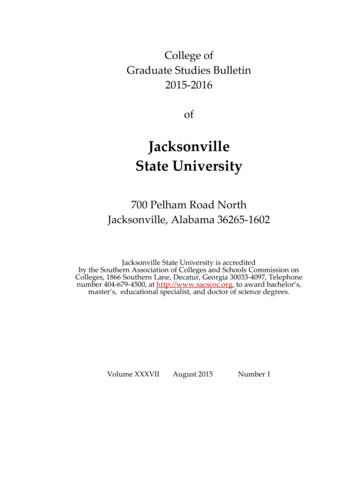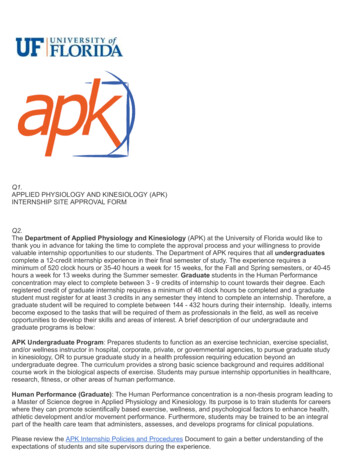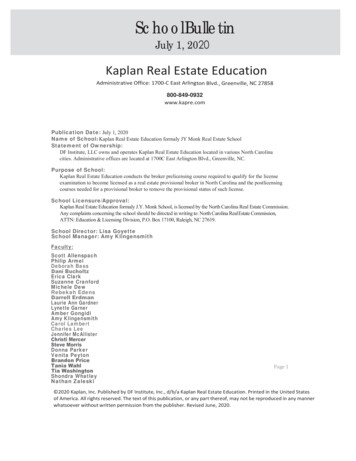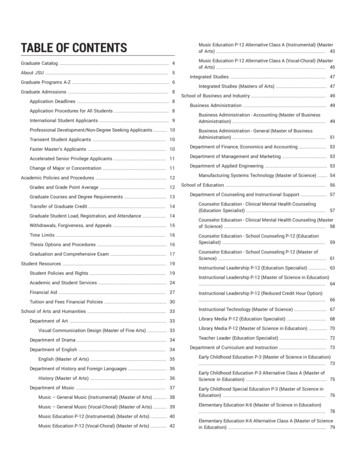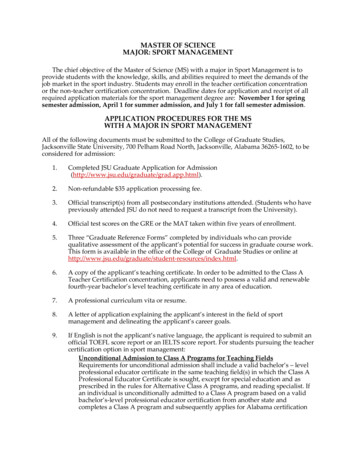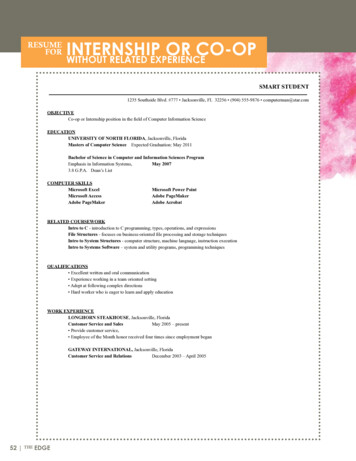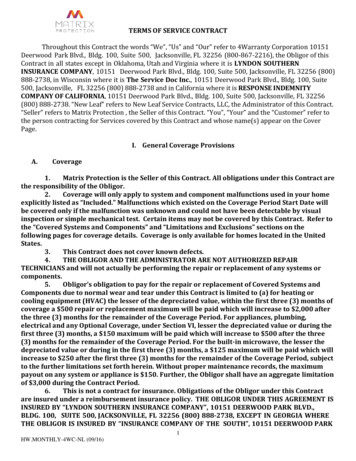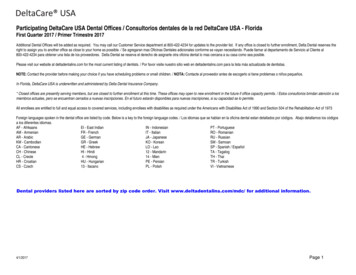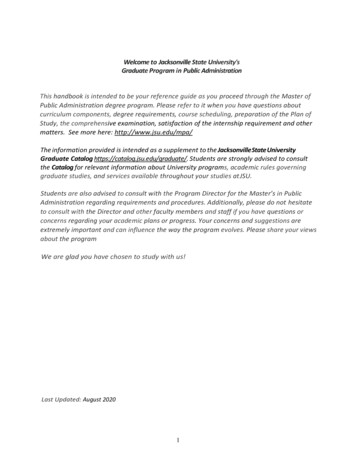
Transcription
Welcome to Jacksonville State University'sGraduate Program in Public AdministrationThis handbook is intended to be your reference guide as you proceed through the Master ofPublic Administration degree program. Please refer to it when you have questions aboutcurriculum components, degree requirements, course scheduling, preparation of the Plan ofStudy, the comprehensive examination, satisfaction of the internship requirement and othermatters. See more here: http://www.jsu.edu/mpa/The information provided is intended as a supplement to the Jacksonville State UniversityGraduate Catalog https://catalog.jsu.edu/graduate/. Students are strongly advised to consultthe Catalog for relevant information about University programs, academic rules governinggraduate studies, and services available throughout your studies at JSU.Students are also advised to consult with the Program Director for the Master’s in PublicAdministration regarding requirements and procedures. Additionally, please do not hesitateto consult with the Director and other faculty members and staff if you have questions orconcerns regarding your academic plans or progress. Your concerns and suggestions areextremely important and can influence the way the program evolves. Please share your viewsabout the programWe are glad you have chosen to study with us!Last Updated: August 20201
Table of ContentsAbout the MPA Program. 4History of the Graduate Program in Public Administration . 4Program Mission. . 4Program Administration . 5Program Delivery and General Information. . 5Program Faculty. . 6The Structure of the MPA Program . 7The MPA Components .7The Core Curriculum .7Sequence of Enrollment .7Core Course Scheduling . 8Concentration Component . 8MPA Admissions. 9Admission to Graduate Studies. .9Application Procedures for All Students. .9Additional Application and Admission Criteria for MPA applicants. 10Master of Public Administration Degree Requirements and Policies . 12Credits Required .12The Plan of Study . 12Changing the Plan of Study . 13Six-Year Rule . 13Grade Point Average . 13Incomplete Grades . 14Grade Appeal. 14Transfer of Credit . 14Application for Graduation .15The Comprehensive Examination . 1.6Eligibility to Take the Examination . 16Examination Schedule . 16Structure of the Examination. 16Examination Grading . 17Retaking the Examination .17Comprehensive Examination Guidelines .18The Internship Guide . 19Internship Requirements . 19Identifying Internship Opportunities . 20The Internship Agreement .20Internship Evaluation . 202
Waiving the Internship Requirement. .21Professional Development and Career Planning . 22MPA Careers . 22Career Services . 22Professional Development . 22Connecting with the MPA Program . 23Pi Sigma Alpha National Honor Society . 23Public Administration Website . 2.3Advisory Council . 23Conclusion . 24AppendicesConcentration Profiles . 25Administration Management . 25Criminal Justice . 27Education. 29Emergency Management . 31Political Science . 33Orientation Welcome Packet . 35MPA Diversity Plan. . 46MPA Plan of Study. . 49MPA Audit Form. . 50Course Rotation Schedule. . 51Time to Degree. . 533
About the Master’s in Public Administration (MPA) at Jacksonville State UniversityHistory of the Graduate Program in Public AdministrationThe Graduate Program in Public Administration at Jacksonville State University has producedhundreds of graduates who have gone on to successful and distinguished public service careers.The MPA program is housed in the Department of Emergency Management and Public Administrationwithin the School of Human Services and Social Sciences (SHSSS). All academic programs housed in SHSSSfall under the Division of Academic Affairs.Reflecting its history, in 2013 the Jacksonville State Graduate Program in Public Administration gainedaccreditation from the National Association of Schools of Public Affairs and Administration (NASPAA).To be accredited by NASPAA, a program must meet numerous standards for faculty size and quality,content and structure of curriculum, internship opportunities, and educational support resourcessuch as libraries, computing facilities and placement services.Program Mission, Domains, and CompetenciesThe mission of the MPA program at Jacksonville State University is to provide a diverse studentpopulation with the knowledge and core competencies to become effective public administrators.Through the use of a standardized public administration curriculum and interdisciplinary cooperationwith other programs, our program is able to prepare students for leadership roles in a variety ofpublic and nonprofit organizations. Utilizing traditional classroom, hybrid, and online classes, ourprogram provides quality graduate education that stresses the program values of diversity,leadership, social equity and ethical conduct.Pursuant to its mission, the MPA program has established the following domains and theircompetencies. A graduate of the Jacksonville State University MPA Program should be able to do thefollowing:-To lead and manage in public governance;o A graduate of our program will be able to understand how both structure andculture of public service organizations affect organizational effectiveness.o A graduate of our program will know how to effectively manage human resources andprovide leadership in this regard.-To participate in and contribute to the policy process;o A graduate of our program must be able to identify key stakeholders, theirpositions, coalitions, and the political context.o A graduate of our program must be able to understand and apply the differentaspects of the policy making cycle.-To analyze, synthesize, think critically, solve problems and make decisions;o A graduate of our program will be able to utilize data and analytic techniques,4
scholarly research, and best professional practices in systematically analyzing andmaking policy and administrative decisions in public service organizations.o A graduate of our program must be able to apply these concepts to a real world(substantive) case.-To articulate and apply a public service perspective;o A graduate of our program will be able to make informed decisions and managepublic service organizations in the public interest by effectively utilizing andbalancing key public service values.o A graduate of our program will understand the value of fair and transparentadministration and will be able to effectively and ethically engage citizens inpublic service organizations.-To communicate and interact productively with a diverse and changing workforce andcitizenry.o A graduate of our program will have the ability to develop and exerciseintercultural sensitivity with employees and other stakeholders.o A graduate of our program will be able to communicate and engage appropriately,effectively and respectfully with multiple audiences.Program AdministrationThe MPA Program Director administers the program with the assistance of the Public AdministrationFaculty and other staff. Although reporting to the Chair of the Department, the Director has primaryresponsibility for admission and advising of students. The Director also serves as the Primary Advisorfor the MPA Program and should be the first point of contact for questions regarding course selection,the order in which courses should be taken, and other academic-related questions.The Director consults closely with the MPA Faculty regarding program issues. The Director also worksclosely with the Office of Graduate Studies Director. From time to time, the Office of Graduate Studies,the Dean, and the Associate Provost’s office is involved in reviewing program modifications or inadmission or retention actions.Program Delivery and General InformationCourses in the MPA program are offered on-campus in the classroom, online, and in a hybrid/on-campusformat. The degree consists five concentrations: Administrative Management, Criminal Justice, Education,Emergency Management, and Political Science. A minimum of 39-40 credit-hours are required for degreecompletion, depending upon the concentration chosen by the student. Students typically complete thedegree in 2-3 years. The program averages approximately 40-50 active students enrolled at any given time.In special circumstances, undergraduate students at JSU may be able to participate in the accelerated seniorprivilege or the Faster Master’s, which allows undergraduate students to begin enrolling in graduate coursesprior to completing their undergraduate degree at JSU https://catalog.jsu.edu/graduate/admission/.5
Program Faculty:Dr. Tim BarnettPhD-Political ScienceThe University of Kansastbarnett@jsu.eduDr. Paul HathawayDA-Political ScienceIdaho State Universityphathaway@jsu.eduDr. Dan KrejciPhD-Political ScienceTexas Tech Universitydkrejci@jsu.eduDr. William LesterPhD-Political ScienceTexas Tech Universitywlester@jsu.eduDr. Allison NewtonEdD-Higher Education AdministrationThe University of Alabama(Program Director)anewton@jsu.eduDr. Manabu SaekiPhD-Political ScienceThe University of New ulty.html256-782-5925 or 56506
The Structure of the MPA ProgramThe MPA ComponentsThe MPA degree program consists of four components:-The core curriculum or required courses (27 credit hours, 9 courses);The internship (if required, 3 credit hours, 1 course);The concentration coursework (12-13 credit hours, 4-5 courses); andThe comprehensive examination.The Core CurriculumThe core curriculum is designed to provide students with a common body of knowledge and skillscentral to the work of public managers. This curriculum has evolved with the faculty's continuousstudy of NASPAA standards, the practices of other MPA programs and the educational needs ofpublic service professionals. The core consists of the following nine courses (27 credit-hours):Sequence of EnrollmentIn order to be prepared for subsequent courses, students should take PSC 500 within the firsttwo semesters enrolled or in the first available semester. Students are encouraged to prepare aPlan of Study using the course rotation schedule early in the process. The order in which corecourses are taken may be affected by their availability. Students are also encouraged to be incontact with their concentration advisor during their first semester of coursework.Students generally complete most of the core coursework before taking concentration work;however, this pattern may be modified by the scheduling of concentration courses of particularinterest to a student and under advisement of the concentration faculty advisor.7
Core Course SchedulingEach of the core courses is offered at least once during a calendar year (see appendix for proposedcourse scheduling). However, a faculty sabbatical leave may require a core course be offered during adifferent semester than is customary. Please plan accordingly.Concentration ComponentThe MPA program is designed as a generalist program to train students to work across sectors, andthe primary focus is the core curriculum. However, the degree also has a concentration component,which permits students to focus on an area of public management or public policy complementstheir professional goals. Thus, there is considerable flexibility in the choice of concentration courses.The MPA degree at JSU offers you 5 different concentration areas. This allows you to focus your career towhat you want to do in the public sector. We offer concentrations in Administrative Management,Criminal Justice, Education, Emergency Management, and Political Science.A concentration consists of a minimum of twelve credit hours of coursework (usually four courses).The concentration coursework may consist of more extensive treatment of topics from the corecourses, for example the concentration in Administrative Management. Or the concentrationcoursework might consist of courses in areas not treated in core courses, such as Education.Most of the work for the chosen concentration will consist of courses offered by other academicdepartments.8
Admission to Graduate StudiesApplicants must meet admission requirements for the program to which they are applying. For specificrequirements of a particular program, see the appropriate program sections of this catalog.To apply for admission to Graduate Studies, a prospective student must complete an online GraduateApplication for Admission and pay the non-refundable 35 application fee. Applications must be submittedwith payment by Discover, MasterCard, or VISA.Applications will be valid for a period of two years. Anyone wishing to reapply after the two-year periodmust submit a new graduate admission application, along with the non-refundable 35 application fee, andcomply with new admission criteria, where appropriate. This will include any returning students who havepreviously completed a graduate degree or certificate program.Applicants who wish to transfer to JSU and be accepted into a graduate degree or certificate program mustbe in good academic standing at their current institution and meet the admission requirements for theprogram to which they have applied.If a student wishes to pursue more than one graduate degree or graduate certificate at a given time, thestudent must contact the Director of Graduate Studies for approval prior to application.Application procedures for all studentsTo be considered for admission to a master's, education specialist, doctoral, or graduate certificateprogram, applicants must hold a degree from a regionally accredited institution or its foreign equivalent.(Please review the Graduate Certificate Disclosure information.)The Director of Graduate Studies
the Catalog for relevant information about University programs, academic rules governing graduate studies, and services available throughout your studies at JSU. Students are also advised to consu
